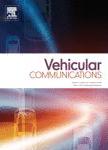版权所有:内蒙古大学图书馆 技术提供:维普资讯• 智图
内蒙古自治区呼和浩特市赛罕区大学西街235号 邮编: 010021

作者机构:Univ New South Wales Sch Elect Engn & Telecommun Sydney Australia
出 版 物:《VEHICULAR COMMUNICATIONS》 (Veh. Commun.)
年 卷 期:2025年第52卷
核心收录:
学科分类:0810[工学-信息与通信工程] 08[工学] 0823[工学-交通运输工程]
基 金:UNSW Australian Research Council Discovery Early Career Researcher Award (DECRA) [DE230101391]
主 题:Vehicle control Optimization algorithms Rotary-wing UAV communications Backscatter networks Security protocol Energy efficiency
摘 要:Autonomous vehicles for intelligent surveillance in rural areas increasingly demand low-cost and reliable data collection technologies to perform dense monitoring across extended areas. Backscattering communication has been employed for this purpose, primarily for low-cost and energy efficiency reasons. This paper considers a backscattering data collection system empowered by unmanned aerial vehicles (UAVs) to overcome the challenge of wireless coverage and provide backscattering tags with physical-layer security. Relevant prior works only focused on the secrecy of backscattering communications, while the limited battery of UAVs was overlooked during the underlying vehicle control. This paper aims to jointly optimize the trajectory of multiple UAVs and choice of tags, as well as tags reflection parameters, to manage data leakage and total energy consumed by UAVs during a round of data collection. Our specific contributions are threefold. (1) We propose a 3D multiUAV backscattering data collection framework and formulate an optimization problem to maximize the ratio of secrecy across all tags to the power consumption of UAVs subject to some practical constraints. (2) We show that our problem is non-convex and partition it into three sub-problems, transform objective functions, and relax certain constraints to obtain approximate convex problems that yield suboptimal solutions. (3) We evaluate the efficacy of our proposed intelligent security protocol for UAV-assisted data collection, compare its performance with some baseline schemes, our protocal achieve leading performance in terms of secrecy energy efficiency. We also provide the impact of parameters on the secrecy energy efficiency, as well as quantify its complexity via extensive simulations.